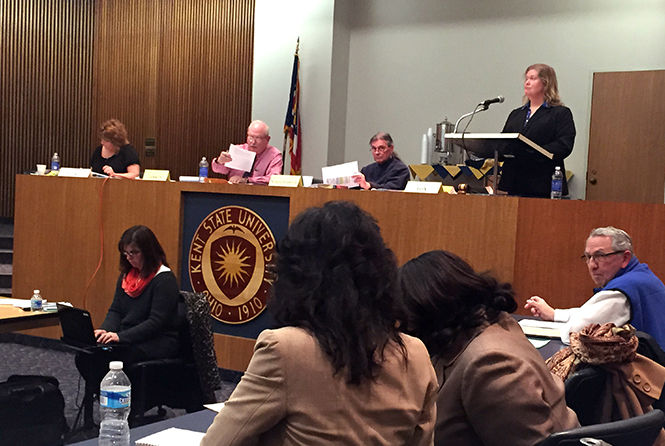Faculty senate approves new minor requirements, revises grading policies
March 9, 2015
Faculty Senate approved the revision of grading policies and undergraduate minor policies during its second meeting of the semester on Monday, March 10.
All undergraduate minors will require a minimum of 12 credit hours, including six upper-division credit hours, instead of nine credit hours. Students will also be required to complete a minimum of 50 percent of the total required credit hours for a minor at a Kent State campus.
The policy, effective fall 2015, will force students who have a minor in the same college as their major to take six credit hours outside of the major or minor they are already pursuing. For example, a student with an integrated social studies major with a concentration in economics could not minor in economics because it would be considered double-counting credits.
“The idea is that the minor is something extra, and so extra courses should be taken and not counted in the majors,” said Elizabeth Sinclair, assistant dean for undergraduate programs. “We’re looking at two extra courses, six credit hours. It’s an added value.”
Senate members argued that the policy would be a disadvantage to students in certain disciplines.
“I would just say in response, I’m not so sure that we need to make that declaration if our students want to work the curriculum in ways to have majors and minors combinations for their resumés to be able to market themselves more effectively,” said Jeffrey Child, associate director of communication studies. “Why should we prevent, or put that policy (in effect) that minors are essentially then only for non-majors?”
Associate degree-seeking students will now be able to complete a minor that enhances their field of study outside of their major. The new policy change will not include students in the Associate of Arts, Associate of Sciences or the Associate of Technical Study degree because these degrees do not have a specialized major.
Senate members also approved a proposal to update grading policy language, clarify policy practices and bring consistency among different grading policies, said Melody Tankersley, associate provost for Academic Affairs.
Academic grades, including the traditional marks like As and Bs, will no longer be combined with administrative marks that show a student’s progress in a class, such as IN (incomplete) and IP (in progress) to differentiate between traditional marks for student performance, which are reserved for letter grades.
Kent State’s grading policy language will also say that students earning a D grade will pass a course without using the additional administrative mark of unsatisfactory, or U, that the grade previously carried.
Both Kent State President Beverly Warren and Senate Chair Lee Fox Cardamone emphasized the importance of regional campuses and their faculty. Warren clarified the role of the “1 University” Commission, stating that its purpose is to preserve the individual missions of all Kent State campuses while effectively collaborating with one another. It is important, she said, to serve unique regional community needs.
Cardamone said some regional campus faculty feel they are not equal in terms of inclusion with the Kent Campus, and feel they do not have adequate time to devote to research, according to a response from the Regional Campus Faculty Advisory Council to Deborah Smith Faculty Senate Vice Chair regarding the difference in treatment of tenure and non-tenure track faculty on regional campuses.
Senate members also unanimously approved the establishment of the Master of Geographic Information Science Degree, which will require a minimum total of 32 credit hours and will only be offered online. The major is made up of three concentrations: CyberGIS, Environmental Geographic Information Science and Geographic Information Science and Health, said Janis Crowther, associate dean of the College of Arts and Sciences.
The next Faculty Senate meeting will be April 13, 2015.
Contact Victoria Manenti her at [email protected].

























